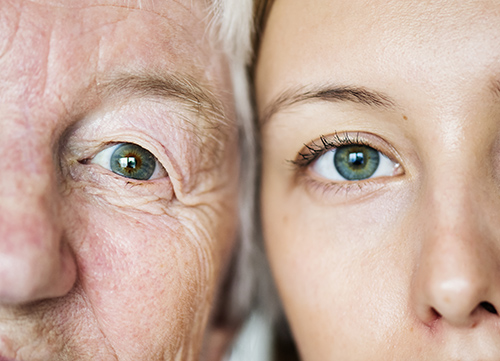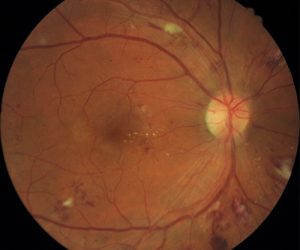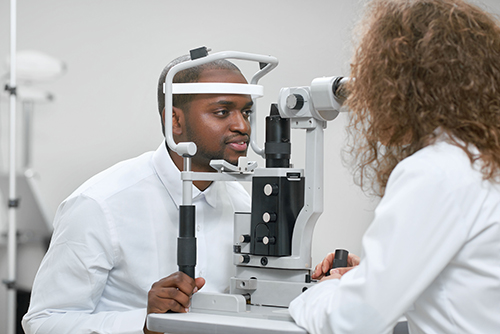Have you tried VitroCap® N?
VitroCap®N is designed to supplement your diet to help support the eye’s need for specific micronutrients. VitroCap®N food supplement is not a substitute for a varied and balanced diet and a healthy lifestyle!

Almost everyone will experience an eye condition or vision impairment during their life. Clear vision without discomfort is a big factor in good eye health. Maintaining the health of our eyes supports and protects our vision helping to prevent vision impairment and blindness.
In addition, the effect of poor eye health isn’t just limited to our eyesight. It can have a huge impact on many other aspects of our life such as our work and mental health.
There are many factors that could affect your overall eye health, some of which can eventually impact your vision. It’s important to take note of any changes in your eyes or your eyesight.
Some common symptoms of eye problems include
If you start to notice changes and have any concerns you should speak with your doctor or optical practitioner.
In some cases it may not be obvious there are changes with your eyes at all. Issues may be picked up during an eye health check-up. This means attending routine eye examinations is important to catch any changes in the eye or with your vision.
Not all changes are an indication of something serious. Sometimes symptoms such as watery or itchy eyes could be a result of reactions to allergies. Sensitivity to light may indicate another health issue such as a migraine. If symptoms continue without a known cause it’s important to get it checked out by a medical professional.
There are several leading causes of vision problems across the world. However, with early identification and treatment, the impact of these conditions can be managed.

Cataracts will cause the lens of the eye to go cloudy over time. A breakdown of the structure in the eye occurs and proteins can clump together. This causes clouding and blurry vision which can lead to vision loss.
Other symptoms include double vision, a ring or halo that can be seen around lights. Double vision can occur as well as difficulty seeing at night and colours looking faded or yellowed.
The Macular is an area at the centre of the retina at the back of the eye. It is necessary for clear sharp vision and if damaged can cause loss of central vision among other symptoms.
AMD is a common cause of vision impairment in people over the age of 55. There are two forms:
Dry AMD – where the slow breakdown of light sensitive cells in the macular occurs.
Wet AMD – where abnormal blood vessels grow under the retina and leak fluids.
The optic nerve is a group of nerve fibers that connects the eyes to the brain. This connection allows for communication between the two.
When Glaucoma occurs the optic nerve can become damaged. Usually, this results from pressure building up in the front of the eye due to fluid that cannot drain properly. This pressure then damages the optic nerve and can lead to blindness if left untreated.
Diabetic retinopathy is a complication of diabetes and can arise in individuals with either type 1 or type 2 diabetes. This diabetic eye disease is one of the leading causes of blindness in the western world.
People with diabetes can develop diabetic retinopathy due to high blood sugar levels. This can cause damage to the tiny blood vessels in the retina at the back of the eye. New blood vessels that try to grow can end up breaking and leaking into the eye.
You can read more on Diabetic retinopathy in our article here.

Right eye retina of a patient with diabetic retinopathy
Additional eye conditions that can result from either internal or external factors affecting eye health include.
While wearing glasses can help support our eyes and prevent eye strain, wearing the wrong prescription can likewise tire your eyes. Focusing your eyes on something for long periods of time e.g. driving long distances or staring at digital screens can also lead to eye strain.
It’s not usually serious despite symptoms like sore, tired, and watery or dry eyes. Normally resting your eyes will help and eyestrain will go away.
Floaters appear as small spots or squiggles floating across your vision. The main cause of floaters is due to changes in the vitreous body ( the gel like centre of your eye).
While they can be irritating to deal with they are usually harmless. However, if you experience flashes of light and/or darkness at the side of your vision, it may be serious. In this case, it may be a retinal tear and it is important to seek out immediate medical attention.
If you would like to know more about eye floaters you can check out our article.
Eye infections can result in symptoms in one or both eyes. Some signs of infection may include pain, itching, irritation or tenderness around your eyelid. Your eye may look pink or swollen or even have discharge coming from it.
Some common eye infections include conjunctivitis (also referred to as pinkeye), Keratitis and stye. These can be caused by viruses and/or bacteria.
Whether you have 20/20 vision or you would like better eye health, it’s still necessary to care for your eyes. Despite the various conditions that can impact your eye health, there are steps you can take to look after your eyes.
It’s necessary to protect your eyes for tasks that may result in debris or other material getting into your eyes. Choose the correct protective equipment for the job, for example, a visor, goggles or safety glasses.
It’s also important to protect your eyes from UV rays. Wearing sunglasses with UV protection can help care for your eyes when outdoors.
Attending regular appointments for eye tests will help track any issues or decline in your eye health. This is especially important if there is a family history of eye conditions. You will also have a useful record of your eye health when seeking medical advice from your eye doctor.

If you spend long periods of time focusing your eyes on computer screens or driving, try to take breaks.
A useful rule to remember is the 20-20-20 rule. After 20 minutes of looking at a screen, look at something 20 feet away, for 20 seconds. The idea is that it will give your eyes a chance to relax and lessen the strain on them.
Use your glasses or contact lenses when needed. However, avoid sleeping in your contact lenses and follow good hygiene practices when putting them in or removing them.
When it comes to healthy vision, a lot of the same actions for improving your overall health apply. Lifestyle changes will help support your general health and eye health.
If you smoke you are more likely to develop serious eye conditions that can lead to vision loss. Smokers are at least two times more likely to develop AMD or Cataracts. Quitting may lower your risk of developing these conditions or could help slow the progression of AMD.
Keeping active can help reduce the risk of health conditions that will impact your eye health. Engaging in moderate activity may lessen the likelihood of developing conditions versus those who are inactive.
It’s recommended to have a diet rich in leafy green vegetables and fish for eye health. This will help provide beneficial nutrients for your eyes as well as support your overall health.
To support their diet people may look for the best vitamins for eye health altogether in one supplement. Nutrients including Zinc and Vitamin C as well as amino acids such as L-lysine can all contribute to eye health. Vitamin supplements should be taken as part of a healthy diet to support healthy eyes.
VitroCap®N is designed to supplement your diet to help support the eye’s need for specific micronutrients. VitroCap®N food supplement is not a substitute for a varied and balanced diet and a healthy lifestyle!